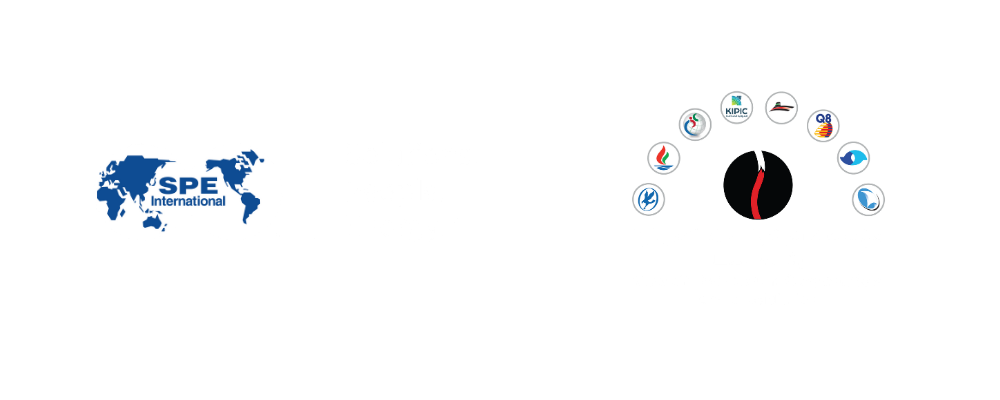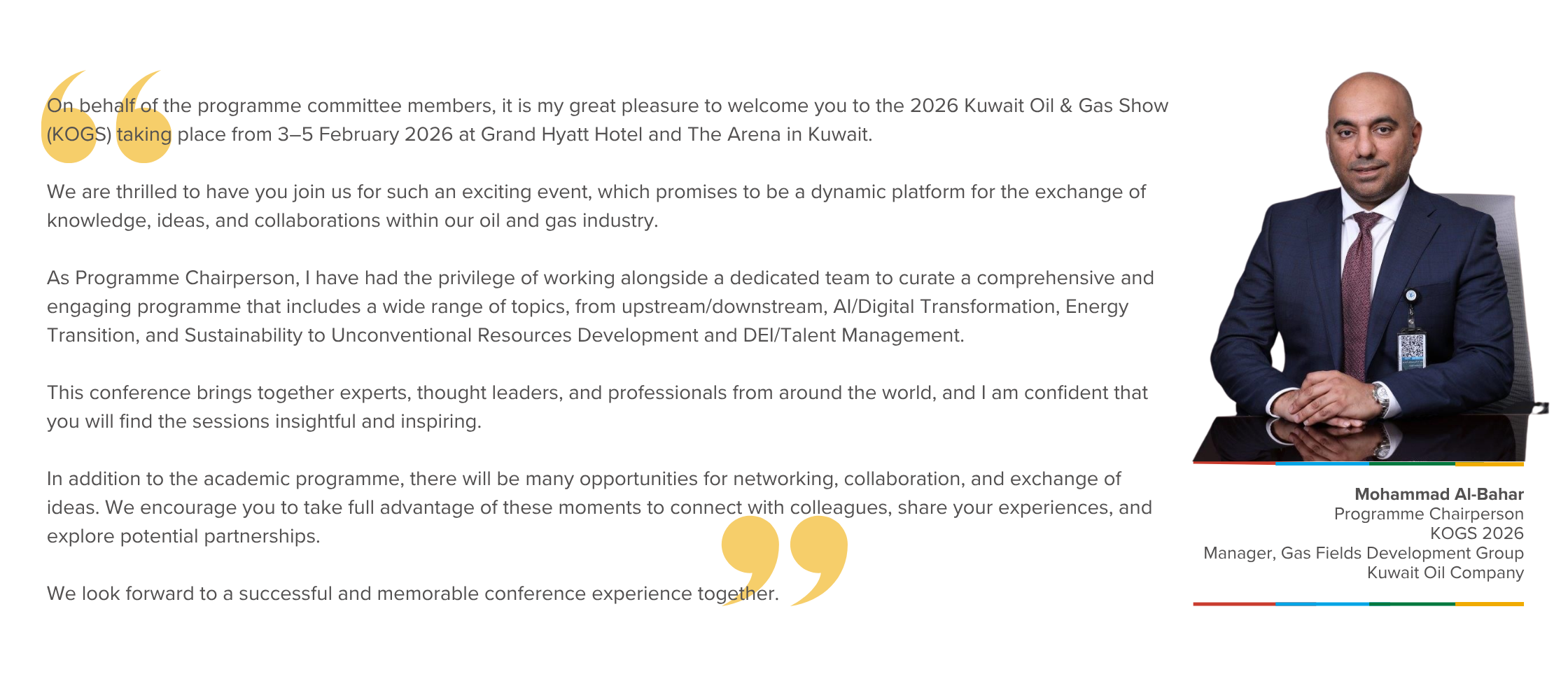Call for Paper Proposals is Closed Now!
Thank you for your submissions. The Programme Committee is currently reviewing proposals and working diligently to develop a world-class technical programme.



Call for Paper Proposals is Closed Now!
Thank you for your submissions. The Programme Committee is currently reviewing proposals and working diligently to develop a world-class technical programme.

01.1 Carbon and Emissions Management and Climate Risk
This subtopic focuses on integrated approaches to reducing carbon footprints and managing emissions across the upstream and downstream industry. It places emphasis on deploying innovative technologies, improving energy efficiency, and incorporating renewable energy sources. It also includes the mitigation of climate-related risks to enhance operational resilience and ensure long-term sustainability.
01.2 Sustainability in Oil and Gas Projects
This subtopic focuses on embedding environmental and social responsibility into the planning, execution, and monitoring of oil and gas initiatives.
01.3 ESG Reporting, Compliance, and Stakeholder Engagement
This subtopic focuses on frameworks, tools, and best practices for ESG reporting and performance measurement aligned with global standards. It also highlights approaches that foster inclusive development, transparent stakeholder communication, and long-term community engagement to ensure a sustainable license to operate.
01.4 HSSE (Health, Safety, Security, and Environment)
This subtopic invites papers showcasing innovative strategies and technologies to enhance safety, environmental stewardship, and risk management across upstream and downstream operations. Key focus areas include emissions reduction, digital HSE systems, safety culture transformation, ESG alignment, and emergency preparedness in line with global standards.
02.1 AI and Digital Twin for Real-Time Operations Optimisation
This subtopic focuses on the integration of Artificial Intelligence (AI), Machine Learning (ML), and Digital Twin technologies to enable real-time decision-making and optimisation across upstream and downstream operations. It includes predictive analytics for drilling and production, AI-driven reservoir modelling, and digital twin frameworks that simulate asset behaviour across the lifecycle.
02.2 Cybersecurity in Energy Industry
This subtopic focuses on cybersecurity in the oil and gas industry, with an emphasis on protecting critical infrastructure, sensitive data, and operations from cyber threats. It involves understanding the unique vulnerabilities of the sector, which relies heavily on industrial control systems and often operates in geographically dispersed locations under harsh conditions.
02.3 Large Language Models and Agentic AI in Upstream Operations
This subtopic focuses on the application and advancement of Large Language Models (LLMs) and Agentic AI within the upstream oil and gas industry. Abstracts should address how LLMs and autonomous agents are transforming exploration, drilling, reservoir management, production optimisation, HSE compliance, and decision support.
02.4 Robotic Automation and Remote Sensing
This subtopic focuses on the utilisation of robotics—such as drones and other robotic systems—including remote monitoring technologies to enhance field and facilities efficiency, safety, and loss prevention.
02.5 Digital Science in Exploration and Production
This subtopic focuses on extracting actionable insights from big data to improve operational performance and reduce uncertainty. It includes the intelligent integration of geoscience data and the application of machine learning to automate interpretation, stratigraphy analysis, and reservoir property prediction.
03.1 Geophysical and Geological Methods
This subtopic focuses on:
03.2 Geomechanics and Subsurface Modelling
This subtopic focuses on integrating geomechanical understanding with reservoir models to improve wellbore stability, development planning, and the exploitation of complex opportunities.
03.3 Uncertainty Reduction in Reservoir Delineation
This subtopic focuses on tools and techniques for reducing geological and petrophysical uncertainty in resource evaluation and volumetric assessments.
03.4 Geosteering, Borehole Imaging, and Formation Evaluation
This subtopic focuses on real-time technologies and workflows that enhance well placement, lithology interpretation, and reservoir understanding.
03.5 Frontier Exploration and Basin Analysis
This subtopic focuses on exploration in deepwater, ultra-deep, and underexplored basins, including stratigraphic and tectonic studies.
03.6 CCUS and Subsurface Storage Evaluation
This subtopic discusses best practices for evaluating CCUS storage potential, including site selection, monitoring, and modelling of geological storage for CO₂ and other low-carbon initiatives (e.g., hydrogen, produced water).
04.1 Integrated Field Development Planning
This subtopic focuses on a holistic approach that combines reservoir, facilities, drilling, and economics for optimal project design and maximum exploitation of hydrocarbon reserves.
04.2 Advanced Reservoir Modelling, Forecasting, and Risk-Based Decision Making
This subtopic focuses on innovative modelling techniques to improve production and recovery forecasting. It includes the application of probabilistic methods, machine learning, and integrated risk models in exploration and reservoir development planning.
04.3 Well and Facilities Planning Optimisation
This subtopic focuses on designing wells and surface facilities to maximise value while minimising the environmental footprint, including the implementation of digital field systems.
04.4 Brownfield Redevelopment and Optimisation
This subtopic focuses on techniques for re-evaluating and extending the life of mature fields using modern tools. It includes innovative solutions for production enhancement, such as IOR/EOR techniques and advanced well construction methods.
04.5 Risk-Based Development Strategies
This subtopic focuses on strategic planning approaches that integrate risk management across all development phases.
05.1 Hydraulic Fracturing and Integrated Completion Technologies
This subtopic focuses on innovative fracturing and stimulation technologies aimed at enhancing hydrocarbon recovery from unconventional plays. This includes advanced hydraulic fracturing methods, proppant and fluid system innovations, and real-time monitoring tools. Emphasis is placed on integrated completion designs that account for reservoir heterogeneity, optimising stimulation placement and efficiency to maximise productivity and economic performance in tight reservoirs.
05.2 Geomechanics in Unconventional Plays
This subtopic focuses on managing geomechanical challenges specific to shale, CBM, deep, and tight gas formations. It includes the evaluation of the interplay between stress, pressure, mechanical properties, and strength in rock and soil, which plays a major role in the characterisation and engineering of unconventional plays.
05.3 Well Spacing and Pattern Optimisation
This subtopic focuses on industry best practices for determining optimal well spacing for resource drainage and economic efficiency, including optimisation of fracturing intensity and material utilisation.
06.1 Drilling Technologies
This subtopic focuses on innovations and advancements in drilling technologies aimed at improving efficiency, safety, and cost-effectiveness across various well environments. This includes, but is not limited to, managed pressure drilling (MPD), automated drilling systems, robotics, real-time downhole sensing, and digital solutions for enhanced decision-making and well control. The focus is on practical applications, field case studies, and new approaches that enable drilling performance optimisation in both conventional and complex formations.
06.2 Offshore Drilling and Completions
This subtopic focuses on best practices and technologies in deep and shallow water drilling and completion operations.
06.3 High Pressure High Temperature (HPHT) and Deep Wells Operations
This subtopic focuses on best practices and technologies to manage complexity, risk, and safety in HPHT, deep, and depleted zones.
06.4 Real-Time Drilling Analytics and Automation
This subtopic focuses on best practices in the integration of sensors and AI for real-time optimisation and decision-making while drilling.
06.5 Well Integrity and Barrier Assurance
This subtopic focuses on ensuring long-term well integrity and zonal isolation through proper design, monitoring, and remediation.
06.6 Advanced Completion Technologies
This subtopic focuses on applications of smart completions, multistage systems, and reservoir monitoring for optimising production performance, including well intervention.
07.1 LNG and Gas Processing Developments
This subtopic addresses industry best practices in processing and downstream operations, such as innovations in liquefaction, gas treating, and NGL recovery to meet demand and emission targets.
07.2 Project Execution and Turnaround Excellence
This subtopic focuses on best practices in executing complex downstream projects and optimising turnaround schedules.
07.3 Advanced Process Control, Optimisation, and Operational Excellence
This subtopic explores the latest innovations in process control systems, automation, and data-driven optimisation for downstream facilities and midstream infrastructure. This includes real-time monitoring, predictive analytics, and AI-driven tools aimed at enhancing operational reliability, efficiency, and safety. Case studies on refinery and petrochemical plant performance, digital transformation, and best practices in transportation logistics and asset management are encouraged.
08.1 Future Skills and Talent Development
This subtopic focuses on competencies and talent development to prepare the energy sector workforce with critical technical and digital skills for tomorrow’s challenges. It will also address energy leadership development challenges and future leadership needs.
08.2 Diversity, Equity, and Inclusion (DEI)
This subtopic focuses on promoting inclusive practices that foster innovation, retention, and team performance. It includes the implementation of strategies and practices that create a workplace embracing differences, valuing individuals for who they are, and ensuring fair access to opportunities for all employees.
SPE must comply with all applicable sanction laws, including those of the United States and the United Kingdom. This includes screening individuals and entities against applicable lists of restricted parties to determine whether SPE is prohibited from, among other things, providing services to or receiving services from such parties.
As a result, your abstract will go through a compliance review and if identified one or more authors or the entity they represent is listed on the SDN sanction list, we must regretfully inform you that your paper will not be considered in forming the conference programme. We appreciate your submission and your understanding of KOGS 2026 legal compliance criteria.

Raise
your company’s technical profile at a renowned industry event and have your paper published on OnePetro.org
Please note that abstract submissions should be formatted into four (4) specific paragraphs:
The following guidelines apply:
SPE is adopting ORCiD (Open Researcher and Contributer ID), a widely accepted unique identifier for authors, giving them control over their content and eliminating ambiguities. All SPE authors will be required to have an ORCiD.
Anyone can register an ORCiD ID for themselves for free using a simple online registration form on the orcid.org website. The initial process takes less than 2 minutes. Once created SPE members can also add their ORCiD iD to their SPE member profile.
If you already have an ORCiD ID, please add it to your SPE Member/Customer Profile. Login to SPE.org and update your profile today!
SPE has a stated policy against use of commercial trade names, company logos, or text that is commercial in tone in the paper title, text, or presentation slides. Use of such terms will result in careful scrutiny by the Programme Committee in the evaluation of paper proposals, and the presence of commercialism in the paper will result in it being withdrawn from the programme.
